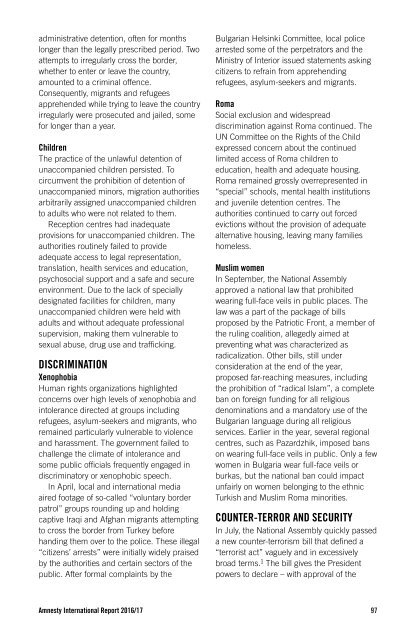AMNESTY INTERNATIONAL REPORT 2016/17
2lEHU9j
2lEHU9j
You also want an ePaper? Increase the reach of your titles
YUMPU automatically turns print PDFs into web optimized ePapers that Google loves.
administrative detention, often for months<br />
longer than the legally prescribed period. Two<br />
attempts to irregularly cross the border,<br />
whether to enter or leave the country,<br />
amounted to a criminal offence.<br />
Consequently, migrants and refugees<br />
apprehended while trying to leave the country<br />
irregularly were prosecuted and jailed, some<br />
for longer than a year.<br />
Children<br />
The practice of the unlawful detention of<br />
unaccompanied children persisted. To<br />
circumvent the prohibition of detention of<br />
unaccompanied minors, migration authorities<br />
arbitrarily assigned unaccompanied children<br />
to adults who were not related to them.<br />
Reception centres had inadequate<br />
provisions for unaccompanied children. The<br />
authorities routinely failed to provide<br />
adequate access to legal representation,<br />
translation, health services and education,<br />
psychosocial support and a safe and secure<br />
environment. Due to the lack of specially<br />
designated facilities for children, many<br />
unaccompanied children were held with<br />
adults and without adequate professional<br />
supervision, making them vulnerable to<br />
sexual abuse, drug use and trafficking.<br />
DISCRIMINATION<br />
Xenophobia<br />
Human rights organizations highlighted<br />
concerns over high levels of xenophobia and<br />
intolerance directed at groups including<br />
refugees, asylum-seekers and migrants, who<br />
remained particularly vulnerable to violence<br />
and harassment. The government failed to<br />
challenge the climate of intolerance and<br />
some public officials frequently engaged in<br />
discriminatory or xenophobic speech.<br />
In April, local and international media<br />
aired footage of so-called “voluntary border<br />
patrol” groups rounding up and holding<br />
captive Iraqi and Afghan migrants attempting<br />
to cross the border from Turkey before<br />
handing them over to the police. These illegal<br />
“citizens’ arrests” were initially widely praised<br />
by the authorities and certain sectors of the<br />
public. After formal complaints by the<br />
Bulgarian Helsinki Committee, local police<br />
arrested some of the perpetrators and the<br />
Ministry of Interior issued statements asking<br />
citizens to refrain from apprehending<br />
refugees, asylum-seekers and migrants.<br />
Roma<br />
Social exclusion and widespread<br />
discrimination against Roma continued. The<br />
UN Committee on the Rights of the Child<br />
expressed concern about the continued<br />
limited access of Roma children to<br />
education, health and adequate housing.<br />
Roma remained grossly overrepresented in<br />
“special” schools, mental health institutions<br />
and juvenile detention centres. The<br />
authorities continued to carry out forced<br />
evictions without the provision of adequate<br />
alternative housing, leaving many families<br />
homeless.<br />
Muslim women<br />
In September, the National Assembly<br />
approved a national law that prohibited<br />
wearing full-face veils in public places. The<br />
law was a part of the package of bills<br />
proposed by the Patriotic Front, a member of<br />
the ruling coalition, allegedly aimed at<br />
preventing what was characterized as<br />
radicalization. Other bills, still under<br />
consideration at the end of the year,<br />
proposed far-reaching measures, including<br />
the prohibition of “radical Islam”, a complete<br />
ban on foreign funding for all religious<br />
denominations and a mandatory use of the<br />
Bulgarian language during all religious<br />
services. Earlier in the year, several regional<br />
centres, such as Pazardzhik, imposed bans<br />
on wearing full-face veils in public. Only a few<br />
women in Bulgaria wear full-face veils or<br />
burkas, but the national ban could impact<br />
unfairly on women belonging to the ethnic<br />
Turkish and Muslim Roma minorities.<br />
COUNTER-TERROR AND SECURITY<br />
In July, the National Assembly quickly passed<br />
a new counter-terrorism bill that defined a<br />
“terrorist act” vaguely and in excessively<br />
broad terms. 1 The bill gives the President<br />
powers to declare – with approval of the<br />
Amnesty International Report <strong>2016</strong>/<strong>17</strong> 97


